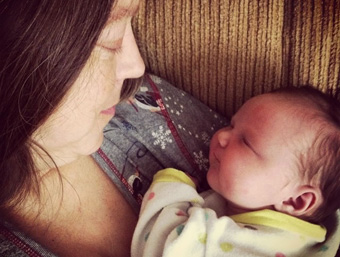Trisomy – Most Common Chromosome Abnormality
 There are many different types of genetic abnormalities. The most common is chromosomal (DNA) trisomy.
There are many different types of genetic abnormalities. The most common is chromosomal (DNA) trisomy.
Trisomy means there are three copies of any one of our 23 chromosomes. Normally, we have two copies of each. Humans have 23 different chromosomes and each chromosome has a duplicate, or back up copy, giving a total of 46 chromosomes.
If there is a third copy of any chromosome then this results in a genetic abnormality. There are three common types of trisomy, depending on which numbered chromosome has the third copy :
Trisomy 21 (Down Syndrome)
Trisomy 13 (Patu Syndrome)
Trisomy 18 (Edward Syndrome)
Chromosomal Abnormalities Increase With Age
Genetic abnormalities can happen with any pregnancy.
Most genetic abnormalities occur in pregnancies of women under 35, because women of this age group have the largest number of children. As a woman ages, the risk of a pregnancy having a chromosomal abnormality increases. Although the risk increases with age, most women who become pregnant after the age of 40 will not have a chromosomal abnormality.
What Causes Genetic Abnormalities?
When a women is born, her ovaries have all the eggs they will ever have. As a woman ages, her eggs also age. The older eggs sometimes have trouble growing, dividing, and evenly sharing chromosomes with the increasing number of cells.
 When an egg is fertilized it has to divide into many cells. This happens over and over again – millions of times to create a baby. Any problem with this division and growth can cause a genetic abnormality.
When an egg is fertilized it has to divide into many cells. This happens over and over again – millions of times to create a baby. Any problem with this division and growth can cause a genetic abnormality.
The cause of a serious genetic abnormality usually happens very early when there are only a few cells. When these early cells have abnormal genetic information, then all of the cells they produce will have the same abnormal genetic information.
The majority of chromosomal abnormalities result in early pregnancy loss (miscarriage). Many of these pregnancies will not go beyond early implantation and other genetically abnormal pregnancies will miscarry during the first trimester. Some will not miscarry, but, instead, could develop past the first trimester and progress to a full term pregnancy.
Trisomy 21, also known as Down Syndrome, is the most common trisomy that can progress past the first trimester.
Genetic Abnormalities After Tubal Reversal or IVF
 Genetic abnormalities can occur in pregnancies after tubal reversal or after IVF.
Genetic abnormalities can occur in pregnancies after tubal reversal or after IVF.
Naturally conceived pregnancies which have genetic abnormalities usually miscarry either before implantation or before the end of the first trimester. This is similar to what happens in the general population of women who have not had a tubal ligation and subsequent tubal reversal.
Genetic abnormalities and birth defects can also occur in pregnancies conceived with IVF. Many of these abnormal IVF pregnancies will fail to fertilize or grow and will not be transferred into the mother. Since genetic abnormalities can occur in both naturally and IVF conceived pregnancies, recommendations for genetic screening and testing are the same for pregnancies which are the result of either IVF or natural conception.
Preimplantation and Prenatal Genetic Testing
Preimplantation genetic diagnosis can be used to detect genetic abnormalities in embryos prior to uterine transfer. This testing is expensive and adds to the cost of the IVF treatment. IVF pregnancies that progress past the first trimester should undergo prenatal genetic screening process according to the same guidelines for naturally conceived pregnancies.
Why These Tubal Reversal Articles for Women Over 40?
Tubal reversal specialists Dr. Berger and Dr. Monteith of A Personal Choice perform only tubal ligation reversal. Since 2001, over 4000 tubal ligation reversal surgeries have been performed at our center.
Approximately 10% of our patients are over the age of 40 at the time they have their tubes untied. We want our patients to be well informed regarding their decision to have reversal surgery and about their pregnancy options and alternatives. We have dedicated this series of articles to these women in hopes they will have all the information needed to make their very personal decisions.
The information contained in this series should be helpful to women of all ages. Our next article will discuss medical tests available to women to detect genetic abnormalities.
The first and subsequent articles can be viewed at Tubal Ligation Reversal After Age 40 – Introduction.
The next blog article discusses and reviews the tests available to pregnant women: Pregnancy After Tubal Reversal: Review Of Genetic Testing.
Tubal Reversal Support: Personal Reversal Stories
 Many personal stories about having a tubal reversal can be found on our Tubal Reversal Blog. Readers are also invited to join discussions with other women on our Tubal Reversal Message Board.
Many personal stories about having a tubal reversal can be found on our Tubal Reversal Blog. Readers are also invited to join discussions with other women on our Tubal Reversal Message Board.
We have recently published two stories about pregnancy success in women over 40:
Denita: Tubal Reversal And Short Tubes: Pregnant!
Dawne: Natural Pregnancy At 46 After Tubal Ligation Reversal.
Submitted by Dr. Charles Monteith









